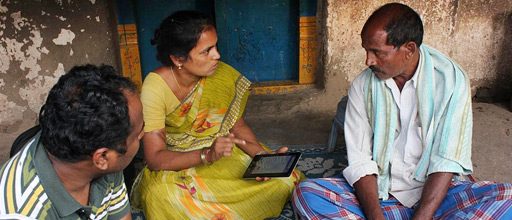
The George Institute for Global Health India to undertake a first-of-its-kind study on common mental disorders
As part of a unique initiative to identify and manage Common Mental Disorders (CMDs) in the community, The George Institute for Global Health India will undertake a first-of-its-kind study where mobile-based technology will be used by community health workers and primary care doctors in selected villages of Andhra Pradesh.
"The idea is to develop and evaluate the feasibility, acceptability and preliminary effectiveness of a multifaceted primary healthcare worker intervention utilizing a mobile device based electronic decision support system to improve the identification and management of individuals with CMDs," says Dr Pallab Maulik, Deputy Director, Research and Development, The George Institute for Global Health, India.
The global burden of mental disorders and treatment gap is large, especially in countries like India due to poor awareness about mental health and few available resources for providing care. Studies indicate that one in four adults in India suffer from some common mental disorder like depression, anxiety, or emotional problems in their life.
Available research also indicates that in countries like India only 15 to 25 per cent of people suffering from any mental disorder receive any form of care. Key reasons for this are the high level of stigma against mental disorders and the lack of trained mental health professionals. Adequate care may be in the form of medicines or psychological help, and often needs good social support.
"A potential strategy to narrow this gap is by enabling the available primary-care workforce through provision of affordable, accessible and high-quality electronic clinical decision support," says Dr Maulik.
The study to be funded by the Welcome Trust /DBT India Alliance Intermediate Career Fellowship awarded to Dr Maulik, will be conducted in 10 villages of the East/West Godavari districts of Andhra Pradesh. Two key phases are:
- Development of the intervention that will enable suitably trained ASHAs and primary-care doctors to identify and manage CMD in the community; and
- Conduct a large pilot study to evaluate this intervention utilising quantitative and qualitative methods.
Information about adherence to treatment will also be monitored by ASHAs using feedback received by them on their phones.
The project will have a pre-post design and will include screening, diagnosis and management algorithms for specific mental disorders. In collaboration with World Health Organization, it will use the mhGAP intervention guide algorithm developed by them and suitably adapt it for the local setting. Both quantitative and qualitative assessments will be done as part of the study.
"This study will result in the development of a highly innovative intervention to improve mental health outcomes in a community with great need. It is anticipated that it will lead to development of a robust intervention for subsequent large-scale implementation and rigorous evaluation," said Dr Maulik
SMART Health is a primary healthcare "ecosystem" for resource-poor settings that is designed to enable the Systematic Medical Appraisal, Referral and Treatment (SMART) of patients at high-risk of premature death or disability.
The system was initially developed for the management of common cardiovascular diseases in rural and remote Australia, and has recently been extended to rural India with support from the Global Alliance for Chronic Disease. However, SMART Health offers much broader potential to transform primary healthcare for a range of those conditions most likely to kill or maim people living in resource-poor settings.
How it works
A new healthcare workforce supported by innovative technologies and processes offers the promise of affordable sustainable primary care on a scale larger than has ever previously been possible. SMART Health is built on three key principles:
- It is designed specifically with users (both consumers and providers) at front of mind
- All components and processes are based on the best available evidence
- The services delivered must be widely affordable to the community in which they are offered




